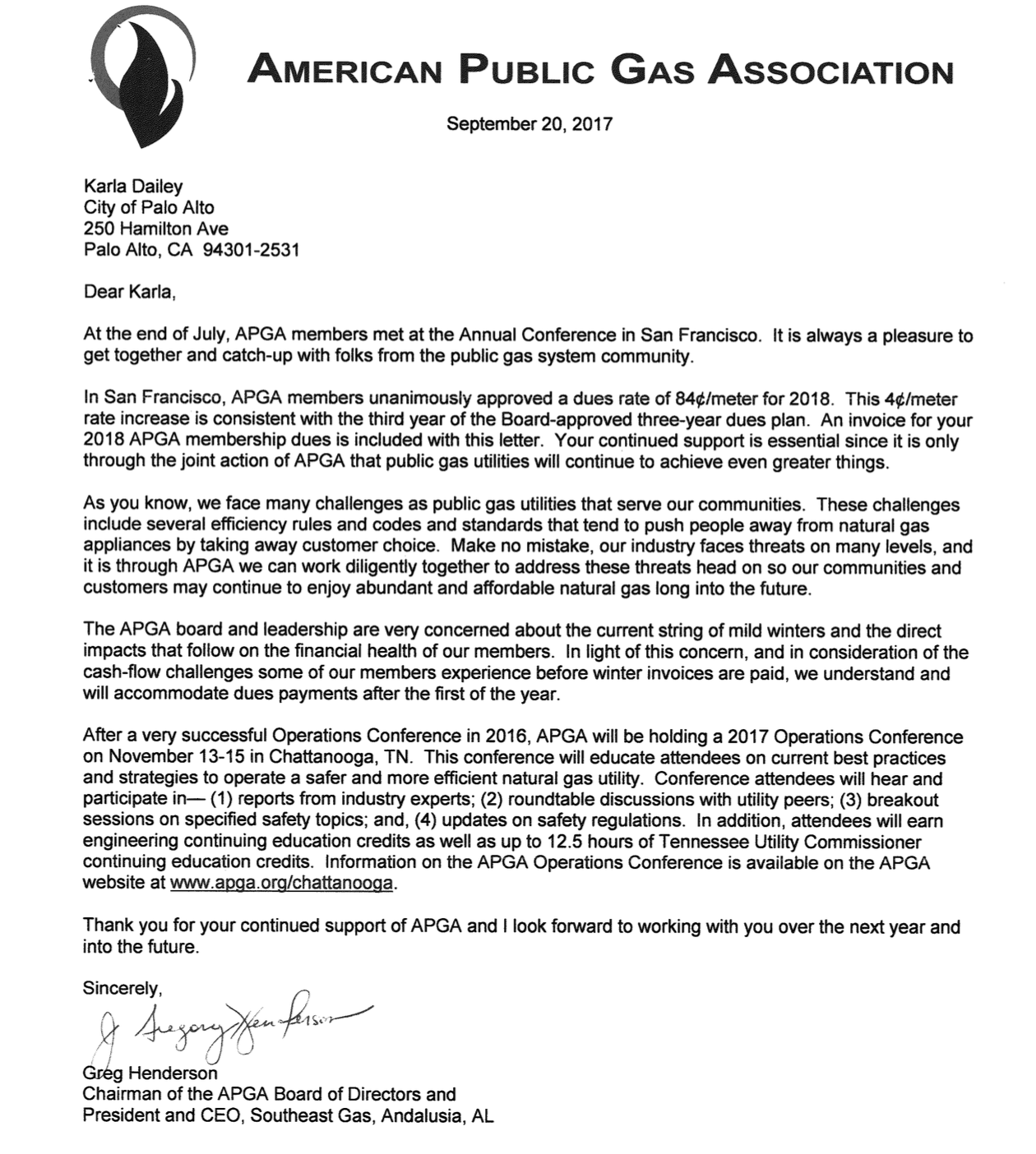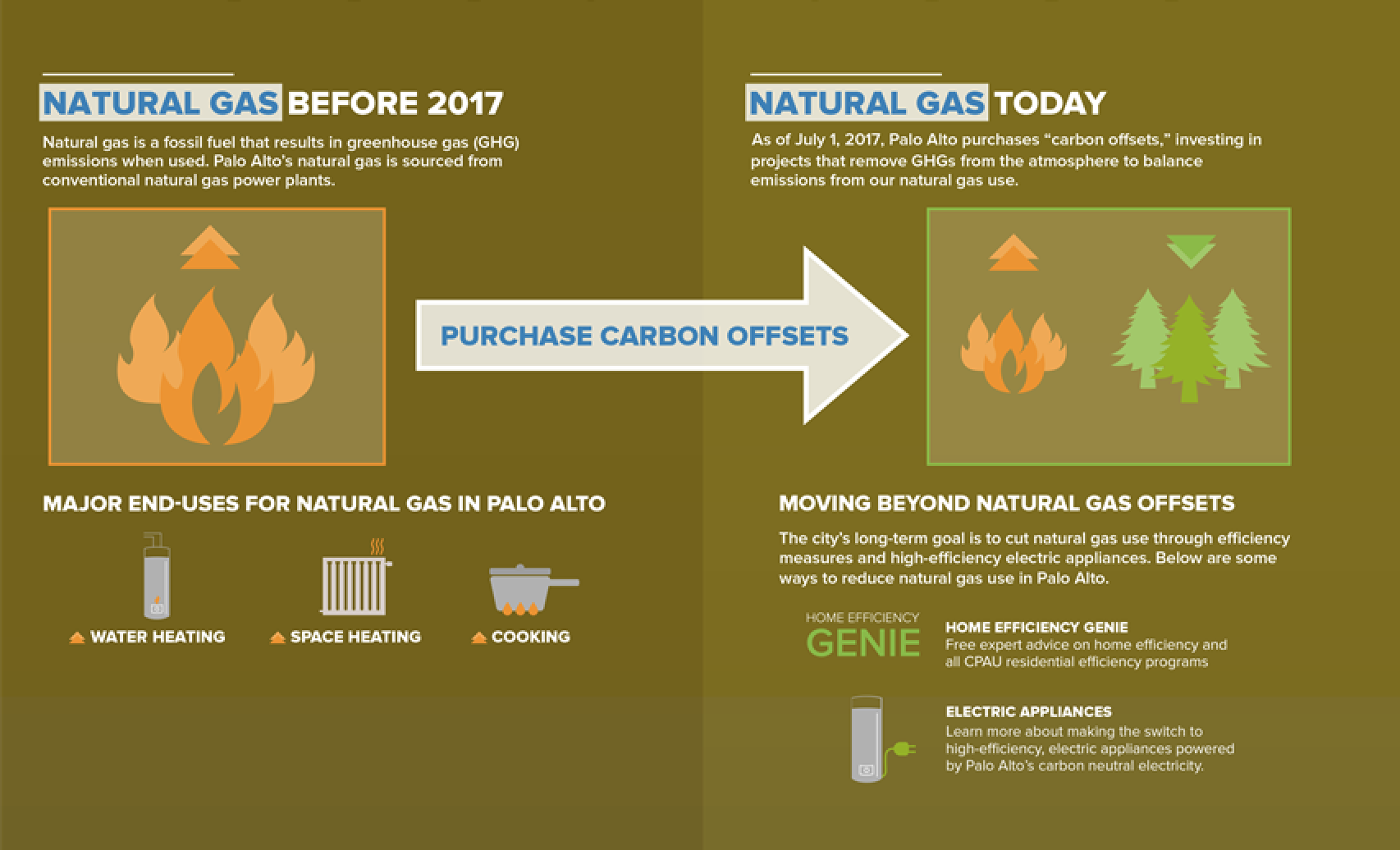Nearly a year ago, the city of Palo Alto — home to Stanford University and the unofficial capital of Silicon Valley — joined a handful of other California cities in enacting an all-electric building mandate. City leaders touted the new law, which is intended to tightly restrict future use of natural gas-powered heating and cooling in new construction, as an important part of the city’s plan to slash greenhouse gas emissions 80 percent by 2030.
At a time when California is facing climate change–driven extremes like sweltering temperatures and unprecedented wildfires, the urgency of achieving this emissions reduction target seems clear.
But as Palo Alto moves to curb climate pollution and phase out natural gas in buildings, the city is still involved with a lobby group devoted to promoting this fossil fuel. Environmental advocates call it a conflict of interest that is undercutting Palo Alto’s commitment to curbing global warming.
“Palo Alto is very pro-electric and has very aggressive climate goals, yet they’re still funding an entity that is trying to undermine those objectives,” said Matt Vespa, a California-based attorney with the environmental law organization Earthjustice. That entity is the American Public Gas Association, or APGA, a gas industry trade group that opposes policies to phase out natural gas.
Leading climate and energy experts say addressing the climate crisis requires an “electrify everything” approach of switching up everything currently running on combustion to getting power via the electric grid, since electricity can be generated from sources that don’t emit greenhouse gases.
As Palo Alto and other cities across the country are starting to embrace this approach of electrifying everything from vehicles to buildings, the fossil fuel industry and its trade groups like APGA are vehemently pushing back.
“Make no mistake, our industry faces threats on many levels, and it is through APGA we can work diligently together to address these threats head on so our communities and customers may continue to enjoy abundant and affordable natural gas long into the future,” an APGA representative wrote in a September 20, 2017 cover letter to a Palo Alto city official.
Screen shot of the cover letter accompanying Palo Alto’s 2018 APGA membership dues invoice.
APGA represents municipal or publicly owned gas utilities in lobbying Congress and energy regulators, claiming over 700 public gas utility members. The group is aligned with the larger gas industry, including investor-owned utilities, petroleum and pipeline companies, and gas utility trade associations like the American Gas Association.
Investor-owned gas utilities such as Southern California Gas and Chesapeake Utilities are projected to contribute $150,000 this year to APGA, according to documents obtained by the Climate Investigations Center. Oil giant BP and top fossil fuel financiers like JP Morgan and Goldman Sachs are among APGA’s national sponsors .
The group is spending over a half million dollars in 2020 on anti-electrification advocacy efforts, according to documents obtained by the Climate Investigations Center.
Palo Alto remains a member of APGA and pays about $21,000 a year in annual dues, according to records obtained by Earthjustice and shared with DeSmog.
Even as the devestation from the climate crisis depeens, the gas industry has doubled down on coordinated campaigns to fight progress, largely funded by gas utility trade group memebership dues paid for by gas customers and cities like @cityofpaloalto. https://t.co/pIbVzrWO3L
— Matt Vespa (@missionvespa) August 20, 2020
Palo Alto Adopts Building Electrification Policy
In November 2019 the Palo Alto City Council adopted its mandate for all-electric new buildings. More than 50 cities and counties in California have committed to or are considering similar policies.
Under Palo Alto’s electrification policy, all new construction from 2020 onwards must have either an all-electric design with no gas hookups, or a highly efficient design mixing electric power with natural gas in limited uses, such as gas cooking ranges or fireplaces. The city is also offering incentives to electrify existing buildings.
This story is part of the investigative series, Unplugged: The Gas Industry Is Fighting Efforts to ‘Electrify Everything’
It’s all part of a broader emissions reduction strategy the city pursued since 2016 called the Sustainability/Climate Action Plan Framework. The plan targets an 80 percent reduction of the city’s greenhouse gas emissions below 1990 levels by 2030, two decades ahead of California’s statewide emissions reduction target.
Palo Alto’s municipal utility, called City of Palo Alto Utilities, or CPAU, operates six utility services, including electric and gas. In 2015, the city launched a carbon-offset program called PaloAltoGreen Gas as a short-term strategy to offset CPAU’s emissions, primarily via capturing methane from livestock operations such as a dairy farm called Green Valley Dairy in Krakow, Wisconsin. Thanks to these offsets, CPAU claims to be the first carbon neutral utility in the world.
Graphic from City of Palo Alto Utilities website
Beyond offsets, Palo Alto’s stated long-term goal is to reduce gas use through implementing energy-efficiency measures and facilitating the use of high-efficiency electric appliances. This transition away from direct use of gas means the future of the city’s gas utility is highly uncertain. Palo Alto has acknowledged as much: A recent staff report submitted to the city’s Utility Advisory Commission, or UAC, noted that achieving the 2030 climate target could result in a “non-viable gas utility,” or at least a gas utility that is “significantly scaled back.”
Paying a Gas Industry Trade Association
At the same time that Palo Alto is grappling with the future of its reliance on natural gas, the city remains a member of the APGA. According to records obtained via a freedom of information request by Earthjustice, the city paid nearly $20,200 to APGA in 2018 membership fees and about $21,000 in 2019, and APGA has billed the city about $21,500 for its 2020 membership.
“Palo Alto’s stated policies are very oriented towards strong climate action and reducing greenhouse gas emissions, so it seems inconsistent to be then funding through membership dues a fossil fuel trade group that actively lobbies against such policies,” Earthjustice’s Rebecca Barker told DeSmog.
Earthjustice has brought this information to the attention of environmental activists in the local community, including the Unitarian Universalist Church of Palo Alto’s Green Sanctuary Committee.
In July, Earthjustice raised concerns about Palo Alto’s APGA membership with CPAU. According to Earthjustice attorney Matt Vespa, CPAU’s Christine Tam, a senior resource planner, replied with a two-sentence explanation: “In response to your comment, the Engineering and Operations team at CPAU rely on APGA for safety-related information. We do not participate in their lobbying efforts.”
Since then, CPAU has continued to receive comments from some members of the public questioning the city utilities department’s continued membership in APGA, according to a packet of documents linked to the Utility Advisory Commission’s September 2, 2020 meeting agenda online. The UAC is a seven-member panel appointed by the city council to help provide oversight and advice to the utilities department (CPAU).
CPAU recently released a statement pointing to the city’s efforts to reduce greenhouse gas emissions and decrease fossil gas usage, but emphasized that maintaining the “safety and reliability” of the gas system remains a priority.
“The City is aware of APGA’s advocacy efforts and has expressed concerns about the APGA’s positions. APGA staff is aware that Palo Alto does not share its positions,” CPAU noted in its online statement, but the agency “believe[s] that continued membership continues to be in the community’s best interests at this time.”
Palo Alto’s director of utilities, Dean Batchelor, did not directly acknowledge any conflict between the city’s APGA membership and its plans to phase out natural gas. “We have reiterated that Palo Alto is actively exploring electrification in our service territory and developing relevant policies and programs while carefully considering the operational implications for our gas utility operations,” he said, and “will continue to do so when corresponding about these issues.”
Time to End Palo Alto’s APGA Membership?
Some community members, however, say it’s time for the city to cut ties with APGA.
“It’s time for CPAU to end its membership in [the gas lobby], and find another organization that can provide the technical information that [APGA] provides,” Debbie Mytels, a Palo Alto resident and chair of Peninsula Interfaith Climate Action, wrote in a September 2 email to the UAC. “Cutting off membership at this time would send a strong signal to [APGA], reminding them that their organization was established to provide for the needs of PUBLIC utilities, not the needs of the ‘natural’ gas industry.”
Jeralyn Moran, a co-chair of the Green Sanctuary Committee, agrees that it’s time for the city to end its payments to APGA.
“Ideally we as a city of Palo Alto could steer clear of our relationship with APGA and move forward toward more clean energy,” Moran says. “Renewing our relationship with an entity like this is sending a bad message, that the Palo Alto [climate] goals are not all that important, that we can kind of blow it off and we have lots of time, which we don’t.”
Bill Hilton, another member of the Green Sanctuary Committee, calls the city’s ongoing membership in APGA “hypocritical,” and said the group has begun ”stirring the pot” on the APGA membership within the local community.
Hilton believes there may be few in city government who know about the membership, and even fewer that APGA is actively lobbying against electrification.
Members of the Palo Alto City Council did not immediately respond to requests for comment.
“At the end of the day, we have to live our values and spend city funds accordingly,” while also maintaining a safe and steady energy supply, said Steven Lee, a candidate for the Palo Alto City Council in the upcoming November election, who intends to advocate for severing the relationship with APGA if elected.
“As Palo Alto moves away from natural gas and towards greater energy efficiency and electrification,” Lee said, “we also need to defund trade groups who are actively resisting the necessary change and progress we must make to tackle climate change.”
Check out the DeSmog investigative series, Unplugged: The Gas Industry Is Fighting Efforts to ‘Electrify Everything’
Main Image: “Plugged in to the sun” utility box mural by Ceevah Sobe on University Avenue in Palo Alto, 2012. Crop of original image by: Adam Fagen, CC BY–NC–SA 2.0
Subscribe to our newsletter
Stay up to date with DeSmog news and alerts









